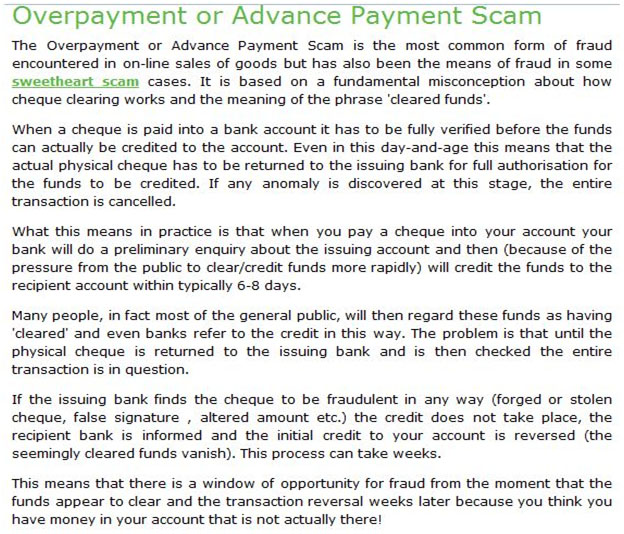Internet is a fast growing technology where there is a lot of room for advancement and development. Internet is a network of networks, where connection is established at one single click. But there are individuals who take advantage of this technology in order to cheat the innocent and unaware users in the name of internet scam. Internet scam dates back to olden days when online users were cheated in the name of connectivity.
Internet scams are deceptive practices carried out online with the intent of defrauding individuals or organizations. They exploit various platforms like email, social media, websites, and messaging services. Common internet scams include phishing, where fraudsters impersonate reputable entities to trick individuals into revealing personal information like passwords or credit card details. Another prevalent scam involves fake websites that mimic legitimate ones to deceive users into providing sensitive information.


Spamming
Scams may find you via your email address. Treat unsolicited emails with the same caution you would junk mail. Junk mail sent electronically is called "spamming".
Spamming is the unsolicited sending of large volumes of electronic messages, typically via email. These messages are usually commercial in nature and often contain advertisements, promotions, or links to websites. Spam messages are sent indiscriminately to a large number of recipients, most of whom have not expressed any interest in receiving such communications. This practice is highly disruptive and can be a significant nuisance for individuals and businesses.
Advices
- Complain to your internet service provider (ISP) and to the spammer's ISP - and remember to include the junk mail's entire header.
- Don't respond - you simply confirm your address to the spammer.
- Set up a private email address for friends and associates and use a free web-based email address (like Yahoo or Hotmail) for any interactions you have with other websites and companies.
Feel Free to use our Spam Checker Tool
Click Video to See About Online Scams



Various forms of Internet scams:
- Identity theft
- Computer crimes
- Credit card scam
- Overpayment fraud
- Auction fraud
- Phishing Scam
1. Identity Theft:
Identity fraud or identity theft is the most common form of internet fraud done by scammers. In this form of internet scam, the scammers hijack the email account of one particular victim in order to have access to all the contact lists from the email account. The scammer then sends mail from some of the email ids that are present in the hacked email account asking to wire money. The victim, who receives the mail, believes that the email is legitimately sent from the friend's email id. It is always advisable for all online users to be careful with such mails received from their friends. It is always a good practice to double check before wiring any amount to the mentioned bank account in the mail. There are many other ways in which scammers conduct identity theft. Filing tax returns is another popular area where scammers file fake returns in the name of deceased users.
Some real time examples of identity theft:
Below screenshot is an example of a female scammer named Cheryl Wright who was sentenced to 72 months in prison along with a payable fine of $690,767 dollars. She was found guilty for filing fake tax returns for dead users. She used personal identifying information and social security numbers of deceased individuals.
Tax fraud identity scam:

Identity theft scam scheme:

Social security number identity theft scheme:

Identity theft is the most popular and common type of internet fraud done by scammers in order to swindle money from innocent users. Online users who are not aware of such schemes used by scammers should be very careful with their identity information. Scammers use email as a medium to send out links appearing to be from legitimate organizations such as banks and ecommerce websites, asking for user's personal information. These mails are framed in a legitimate way that often many users fall prey to such scam emails.
2. Computer crimes:

3. Credit card fraud:
4. Overpayment fraud:
With a number of transactions growing over the internet, scammers are opening new opportunities for themselves and are finding different ways to scam the users. As buying and selling is popular online, scammers are adopting schemes like the overpayment scheme or advance payment scheme where the scammer tries to buy something from your online store or ecommerce platform where you advertise to sell some of your stuff, and try to overpay pay asking for a refund of the difference amount. The strategy here is to obtain the refund amount by issuing a fake check. The user who received the overpayment refunds the extra amount to the scammer and ends up with no money being received from the other end.
Overpayment fraud is popularly known by many other names that resemble the same type of scam attack, like check overpayment fraud, overpayment scam, advance fee fraud, advance payment scam etc.
How does the scam work?
Most of the times, scammers appear to be legitimate buyers and often pay an extra amount which is called "overpayment". The scammer smarty does this overpayment and asks the seller to wire back the additional amount paid.
Below is an example of a victim, explaining his experience in internet overpayment scam: Has someone purchased something from you online, then tried to overpay, suggesting you simply refund them the difference? In my case, I sold a computer on eBay. The buyer wanted me to ship it out of the country and sent me a generous payment via PayPal, asking me to simply refund the difference after I knew the actual shipping cost. The only hitch: The PayPal payment notification was a fake and the eBay account was hijacked. If I'd fallen for the scam, I would have lost my computer and handed cash to the criminal in the process. Alarm bells should immediately go off any time someone overpays you?and don't assume you're in the clear just because your bank cashed the check. They can still come after you to recoup the money once they discover it's a bogus check.

5. Auction fraud:
Auction scam is another form of internet fraud where scammers appear to be legitimate buyers in online auction sites. There are many crimes be committed by fraudsters in almost all the auction sites. The scammer uses the overpayment scheme in auction scam in order to make the user wire the extra money back to the scammer. Such scams operate from Ghana. The scammer uses a fake IP address that appears to be from the United States. After making an overpayment, the scammer insists to wire the money back to Africa. Scammers usually hijack the PayPal account or the account from which you operate in the auction website. The scammers use same tactics in different forms and media thus creating a name of scam in every industry related to the internet.
Some of the problems in auction fraud are:
? Buyers not receiving the goods at all.? Sellers not receiving payment
After this the identity information that the users have entered is at risk. Users should be really careful when entering their information online.

6. Phishing Scam:
The most popular and common type of internet fraud is phishing scam. Phishing is a technique where the scammer manages to masquerade a page on the web when the user is just about to enter the personal information. Say for example, a user uses internet banking facility. When the user sets up the credit card information or password data, the scammer manages to phish a page as same as the banking page. Without the knowledge of this happening the users tend to enter all the details which are stolen by the scammer at the other end. Most common ways in which a scammer becomes successful in phishing attack is by sending emails. The scammer sends emails which appear to have come from the victim's bank, asking them to clarify their personal information.
Phishing scam is where the scammers originate identity theft, user information fraud, credit card scam and so on.
Tips to avoid and beware of internet scam:
- Always cross check with any email appearing to come from your friend's inbox asking you to help urgently by wiring money. These emails can be from scammers having hijacked your friend's email account.
- Do not engage into online buying that do not have secure connection. Research the company well before you buy anything from them.
- Do not provide social security numbers for online purchase. Ecommerce sites do not require social security numbers for completing any transactions.
- Protect your computer with anti spyware, anti malware and ant virus software.
- Do not open attachments. Most of them have vulnerable plug-in that can embed malicious code into your computer.
- It is always a best practice to keep your computer and operating system up to date.
- Do not enable file sharing from your computer.
- Always use a strong password for confidential accounts.
- Always verify links sent from banks via emails. There are chances that there can be phishing mails sent you personal email account.
- Never accept any overpayment or advance payment. Legitimate buyers do not pay anything extra other than the actual amount of the product or service.
- Any online or internet fraud should be immediately reported so that scam from the same scammer is avoided.
- The FBI and FTC take huge steps in order to help the victims of internet fraud.

